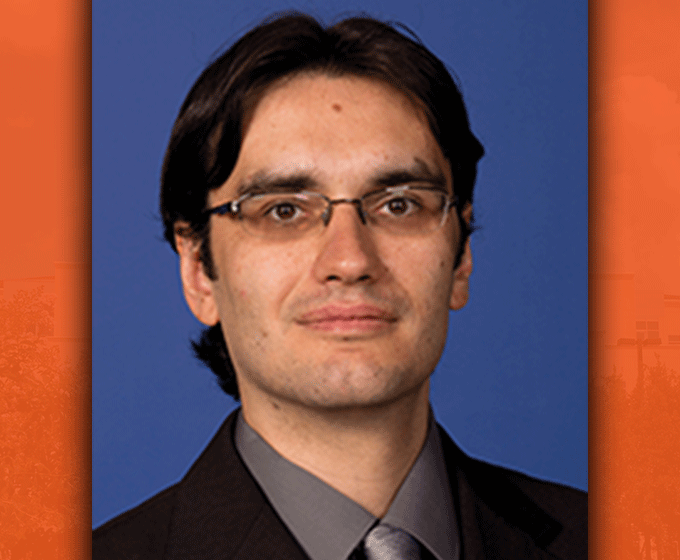
Vittorio Marone
JUNE 9, 2023 — A new study by UTSA researchers provides a cautionary tale for educators, students and consumers about how major technology companies promote their educational products and services.
College of Education and Human Development Associate Professor Vittorio Marone and doctoral student Bruna Damiana Heinsfeld examined the strategies technology companies use in shaping the role of technology in education.
The researchers analyzed the educational homepages of tech industry titans Google and Microsoft, exposing hidden tactics and dynamics that could potentially impact educational systems across the globe. Their findings were recently published in Computers & Education Open.
“Major players like Google and Microsoft have a big influence on how technology is perceived, and that perception can influence the purchase of technology and the expectations about its role in education,” said Marone, Learning, Design and Technology program chair in the Interdisciplinary Learning and Teaching Department. “Therefore, it is important to consider how these companies describe technology and how they present their products and services. By understanding how they do that, we can all become more informed consumers and make better decisions about technology.”
The researchers found that examining how corporations represent technology’s role in education is crucial for understanding its potential effects on educational systems, people —including students, teachers and decision-makers — and society at large.
“This really requires a continuous effort by all consumers, and by critically approaching how companies promote their products, we can make them more accountable for what they do and how they talk about it,” Marone said.
Marone and Heinsfeld used an “unmotivated looking” approach to investigate the Google and Microsoft educational homepages. They weren’t looking for anything specific in their analysis, just how these corporations present technology and the language they use to discuss it.
Marone said one finding is that these companies seem to focus on instilling in consumers a “fear of missing out” or “FOMO” about the future. They claim that the future is challenging and uncertain, and they seem to imply that it can only be seized by using their technologies.
The study also raised concerns about the blurred lines between products created for profit and acts of corporate philanthropy. Marone said Google discusses its charitable activities in conjunction with its products, thus creating an image of a “force for good” and suggesting that by buying their products you’re also contributing to the good in society.
The authors also examined the corporate narrative of “free” and “low-cost” products and services, which provides the perception that they come without costs, perpetuating the belief that surrendering personal information is an acceptable trade-off for progress.
“We are used to giving away our email or information for free in exchange for products and services, and of course this is not free,” Marone said. “We know what happens with our information — or rather, we don’t, and that’s the problem. It’s never really free.”
The study also exposed a concerning trend of portraying technology as the major force in education, overshadowing teachers’ crucial role in supporting students’ learning and development. The research highlighted the marginalized position of teachers in educational technology advertising and the vague promise that technology can solve longstanding and complex educational issues.
Overall, the study provides a framework for analyzing corporate discourse to empower users and decision-makers to critically evaluate claims and make informed choices
UTSA Today is produced by University Communications and Marketing, the official news source of The University of Texas at San Antonio. Send your feedback to news@utsa.edu. Keep up-to-date on UTSA news by visiting UTSA Today. Connect with UTSA online at Facebook, Twitter, Youtube and Instagram.
Enjoy snacks while connecting with Adobe reps and student ambassadors. Download or log into the Adobe Express app to snag swag and unlock exclusive back-to-school templates. It’s a fun, fast way to get creative and start the school year with bold moves.
Central Plaza, Main CampusCelebrate the merger of UTSA and UT Health San Antonio with a pop-up featuring free t-shirts, exclusive swag, and interactive photo opportunities. Open to all students, faculty and staff. Supplies are limited!
Sombrilla Plaza, Main CampusHuddle Against Hunger is a fundraising competition with Texas State that benefits our Roadrunner Pantry. Donations this week will help UTSA earn additional prize monies provided by RBFCU.
In-Person and VirtualJoin UTSA Libraries for an update on federal public access policies and how the library can assist with compliance.
Virtual EventWe invite you to join us for Birds Up! Downtown, an exciting welcome back event designed to connect students with the different departments at the Downtown Campus. Students will have the opportunity to learn about some of the departments on campus, gain access to different resources, and collect some giveaways!
Bill Miller PlazaThere are many citation managers. Which one is right for you? This workshop will explain what a citation manager is and how it can help you organize your citations, insert citations as you write your paper, and generate your bibliography.
Virtual EventPubMed is an essential database for anyone conducting biomedical or health-related research. This workshop will teach attendees how to effectively navigate this free resource and locate peer-reviewed articles using advanced search features, MeSH subject headings, and Boolean operators.
Virtual EventThe University of Texas at San Antonio is dedicated to the advancement of knowledge through research and discovery, teaching and learning, community engagement and public service. As an institution of access and excellence, UTSA embraces multicultural traditions and serves as a center for intellectual and creative resources as well as a catalyst for socioeconomic development and the commercialization of intellectual property - for Texas, the nation and the world.
To be a premier public research university, providing access to educational excellence and preparing citizen leaders for the global environment.
We encourage an environment of dialogue and discovery, where integrity, excellence, respect, collaboration and innovation are fostered.